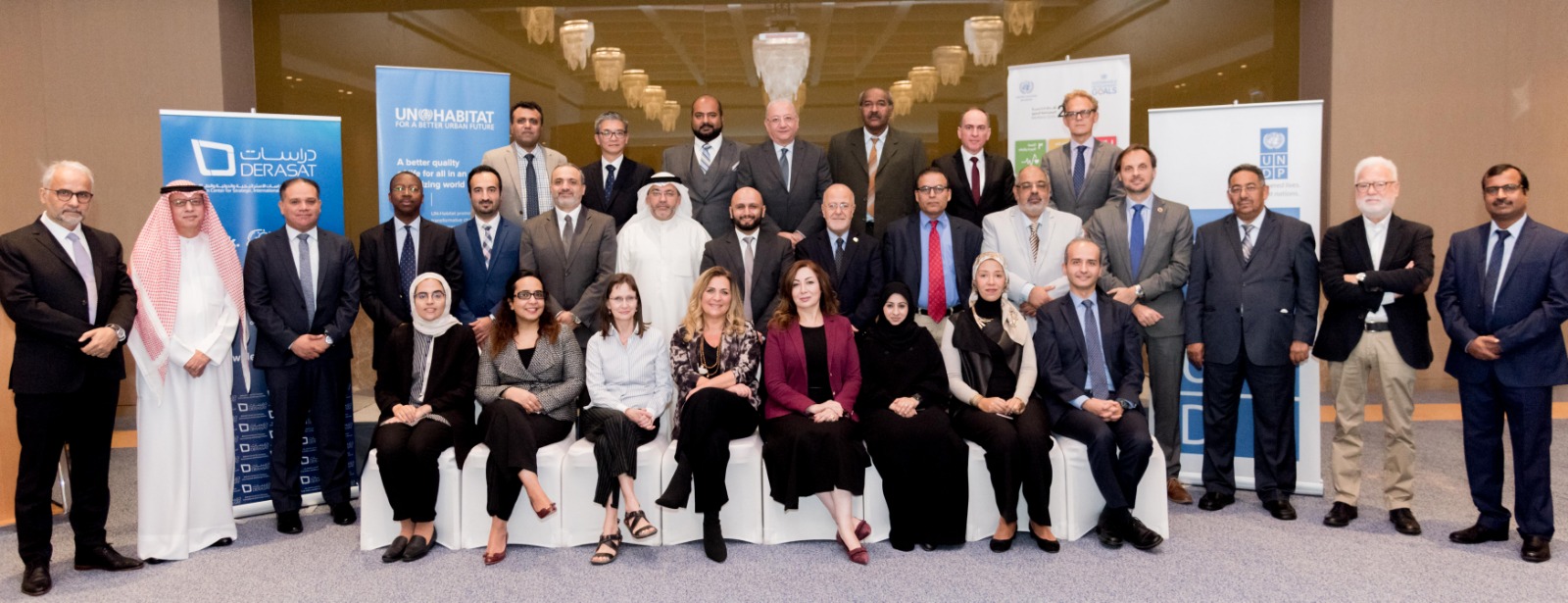Manama, 24 November 2019 - Within the framework of the joint initiative to develop the State of Arab Cities 2020 report, in cooperation with Bahrain Center for Strategic and International Studies and Energy (DERASAT), United Nations Human Settlements Programme Regional Office for Arab States (UN-Habitat ROAS), and United Nations Development Programme (UNDP) in Bahrain, a regional consultation workshop was held in Manama, Bahrain on 20 November 2019 to discuss and validate the first draft of the report, identify the most persistent challenges facing Arab cities with regards to financing urban infrastructure, and propose policy recommendations and effective responses to address these challenges.
The workshop was attended by a variety of experts and decision makers in urban development from several Arab countries, in addition to representatives of Arab regional organizations and United Nations organizations. The discussion focused on the key ideas put forward in the report on increasing the economic role of cities and the need for policies that catalyze their financial resources and diversify their economic activities to achieve balanced urban development.
Mr. Katadah Zaman, Executive Director of ‘Derasat’, stated that "The Kingdom of Bahrain’s support to this initiative is based on the country’s progress achieved in the areas of urban development and improving the quality of life for residents, as well as the national efforts to achieve the SDGs." He also added that “Despite limited space and resources, the Kingdom of Bahrain has a noteworthy experience in this area, the successes of which still resonate well with the UN Habitat Human Settlements Program”.
His Excellency, Mr. Amin Al Sharkawi, UN Resident Coordinator Bahrain, commended the efforts of the Kingdom of Bahrain to support the United Nations in producing new knowledge reports informing future urban policies of Arab Countries towards achieving the Sustainable Development Goals. He added “This report is the first official report on Arab cities since 2012, and will include the latest urban statistics related to Arab cities, and will analyze the data, with a view to come up with conclusions and recommendations on urban planning in Arab cities, and will contribute to the achievement of the Sustainable Development Goals and the New Urban Plan”.
Dr. Erfan Ali, Director of the Regional Office for Arab States of the United Nations Human Settlements Program in Cairo, added “As UN-Habitat is repositioning itself as a centre of excellence and thought leader on sustainable urban development generating specialized and cutting-edge knowledge, it is crucial for us to develop a Second State of Arab Cities Report to contribute to the understanding of the urban complexities of the Arab Cities and further the role of urbanization in advancing the sustainable development of the Arab region”
“The report will review the challenges encountering the urban economic and financial frameworks of Arab countries at the regional, national and local levels, and aim to empower the capacity of urban decision and policy makers,” said Stefano Pettinato, UNDP Bahrain Resident Representative.
He added “This regional meeting today brings together a wide range of local and international experts from the Arab region to discuss and share knowledge. We are glad to collaborate again with UN-Habitat ROAS and the Government of Bahrain, following our collaboration on reviewing Bahrain's housing policy. We would like to thank our partners the Government of Bahrain and UN-Habitat and look forward to the launch of the report”
The Arab Cities 2020 report will look into the challenges encountering the urban economic and financial frameworks of Arab countries at the regional, national and local levels, and the prospects to unleash their growth potential and stimulate their prosperity.
Ultimately, the report will contribute to the implementation of the 2030 Sustainable Development Agenda, the promotion of the Sustainable Development Goals - with focus on SDG 11 - and the New Urban Agenda in the Arab region, by encouraging evidence-based urban policies improving living conditions for city dwellers in Arab countries and is expected to be launched in the second quarter of 2020.
